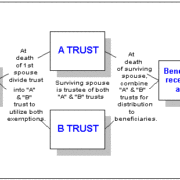I’ve Changed My Mind, How Do I Modify Or Revoke My Trust?
Baron Law LLC, Cleveland, Ohio, offers information for you to reflect upon while you are setting out looking for an estate planning attorney to help protect as much of your assets as you can. For more comprehensive information contact Baron Law Cleveland to draft your comprehensive estate plan to endeavor to keep more of your assets for your heirs and not hand them over to the government by way of taxes.
People change their minds. Circumstances change, family dynamics shift, realities, needs, and desires are fluid. Estate plans reflect the lives of their owners at the moment of their creation. As such, the want, and sometimes need, to adjust and change an estate plan is common. And since a major part of many people’s estate plans are one or more trusts, it is important to understand when, how, and if you can change the terms your trusts or eliminate them outright.
Modifying or revoking an existent trust is not a straight forward prospect. Trusts fundamentally are legal agreements and thus, are bound by Ohio law and procedure. Trusts bring with them a multitude of benefits, from tax incentives, asset protection, and privacy. The other side of trust use is the conformity with the law and strict adherence to, sometimes burdensome, procedure. The law must ensure any changes to trust terms are legitimate and do not improperly harm the settlor, named beneficiaries, or trust assets. What can or cannot be changed within a trust and who can or cannot effectuate that change largely depends on the type of trust and the circumstances of its creation. The modification or revocation of an existing trust is a nuanced area of law, as such, an experienced Ohio estate planning attorney should be retained at the earliest possible opportunity.
The first question to ask regarding changing a trust is, what type of trust do you have? Though there exist numerous types of trusts out there, the focus here is between revocable and irrevocable trusts. Generally, modification or revocation by a settlor is not available for irrevocable trusts. Hence, the significance of the irrevocable nature of irrevocable trusts. (Though recent changes in Ohio law made it possible to overcome the difficulties to revoke or amend an irrevocable trust, that is a topic for a later discussion.) So, amending or revoking a trust primarily concerns revocable trusts. The next question is how many settlors, i.e. trust makers, are there?
Only one Trust Maker
If there is only one trust maker for a revocable trust, revoking or amending a trust is straightforward. Either follow the instructions in the trust documents or use a method that is highly likely to follow the intent of the individual who made the trust, curiously in this instance, you. Ohio law provides:
The settlor may revoke or amend a revocable trust by substantial compliance with a method provided in the terms of the trust or, if the terms of the trust do not provide a method, by any method manifesting clear and convincing evidence of the settlor’s intent… O.R.C. § 5806.02 (C).
Clear and convincing evidence is a legal term of art that means, in this context, the method of revocation or amendment is highly and substantially more probable than not to be true to the intent of the trust settlor. Obviously, this is a subjective standard so, in most cases, if you give a good faith effort and act honestly with no nefarious purpose, you should be alright. Even more obvious is that this situation can be avoided, and no subjective standard need be considered, if the terms of your trust are competently and comprehensively drafted, properly addressing the possibility of revocation and/or amendment within the terms of the trust. This is why an experience Cleveland estate planning attorney is critical, you really can’t put a price on good legal drafting.
Two or More Trust Makers
If there are two or more settlors, it gets more complicated because each party has an equal say in modifying or amending the trust. Thus, the rules attempt to strike a balance between the party who wants a change and the party who doesn’t, focusing primarily on the type(s) of trust property effected by the potential change. Ohio law provides:
If a revocable trust is created or funded by more than one settlor, all of the following apply:
To the extent the trust consists of community property, either spouse acting alone may revoke the trust, but the trust may be amended only by joint action of both spouses.
To the extent the trust consists of property other than community property, each settlor may revoke or amend the trust with regard to the portion of the trust property attributable to that settlor’s contribution.
Upon the revocation or amendment of the trust by less than all of the settlors, the trustee shall promptly notify the other settlors of the revocation or amendment.
Since Ohio is not a community property state, the rule regarding community property is really only relevant in situations where Ohio couples or joint owners possess property in foreign states which follow community property law, such as Wisconsin or California. For most, the non-community property rule applies most of the time. Here, trust amendment or revocation power is tied to original trust property ownership. This is why accurate and timely accounting of trust funding is paramount, so you can track who put what in and have evidence to back it up. Again, this is why an experienced Ohio estate planning attorney is important, he’ll remind you to keep an accounting of your trust funding to provide for this possibility. Granted, this rule does not expressly provide how to account for jointly owned property put in trust. Ohio law does address this possibility, however, it won’t be examined at this time. Ask your estate planning attorney if you’re looking to amend or revoke a joint trust which was funded with jointly owned property.
Ohio law also allows your power of attorney and guardian of the estate to revoke or amend a trust, however, only to the extent expressly authorized by both the terms of the trust and the authority given to your agent. Make sure the terms of your power of attorney and/or guardianship provide for this contingency. Changing a trust in anyway is a serious action that deserve serious consideration of its consequences. Consult a local estate planning attorney to make sure this is the best course of action and any hidden pitfalls are revealed before acting.
Helping You And Your Loved Ones Plan For The Future
About the author: Mike E. Benjamin, Esq.
Mike is a contracted attorney at Baron Law LLC who specializes in civil litigation, estate planning, and probate law. He is a member of the Westshore Bar Association, the Ohio State Bar Association, the Cleveland Metropolitan Bar Association, and the Federal Bar Association for the Northern District of Ohio. He can be reached at mike@baronlawcleveland.com.
Disclaimer:
The information contained herein is general in nature, is provided for informational and educational purposes only, and should not be construed as legal or tax advice. The author nor Baron Law LLC cannot and does not guarantee that such information is accurate, complete, or timely. Laws of a particular state or laws that may be applicable in a given situation may impact the applicability, accuracy, or completeness of the preceding information. Further, federal and state laws and regulations are complex and subject to change. Changes in such laws often have material impact on estate planning and tax forecasts. As such, the author and Baron Law LLC make no warranties regarding the herein information or any results arising from its use. Furthermore, the author and Baron Law LLC disclaim any liability arising out of your use of, or any financial position taken in reliance on, such information. As always consult an attorney regarding your specific legal or tax situation.










